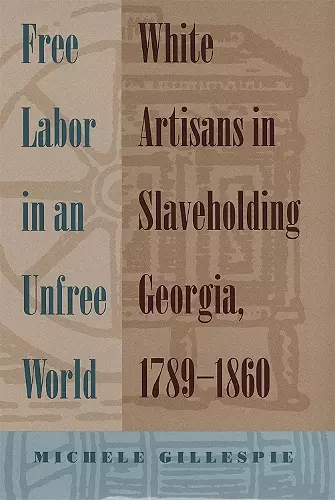Free Labor in an Unfree World
White Artisans in Slaveholding Georgia, 1789-1860
Format:Paperback
Publisher:University of Georgia Press
Published:6th Sep '04
Should be back in stock very soon

White male artisans in the antebellum South occupied a marginal and ambiguous social and professional position very unlike that of their northern counterparts. As skilled, free laborers in a slaveholding society, they did not fit into a defined social class. In the first book-length study of white tradespeople in the pre-Civil War South, Michele Gillespie highlights the complex world and lives of a nearly hidden population marginalized by a growing slave system. Gillespie demonstrates that the appearance of solidarity in the white antebellum South was false, that, in fact, strong class conflicts threatened to divide white southern society.
Beginning with a discussion of the roles and interests of white artisans in the commercial and industrial revolutions and political world of the late eighteenth and early nineteenth centuries, the book explores the migration of craft and trade workers to the South, the evolution of a rudimentary class identity, and the development of political culture and structure among artisan groups during the post-Revolutionary period. Describing the declining social and economic opportunities afforded southern white artisans during an era increasingly dominated by slaves, Gillespie compares their situation with that of their counterparts in the northern states. The book documents the ways in which the hegemony of slavery thwarted efforts to organize a white working class in the South prior to the Civil War. Individual case studies explore the artisans' worlds on a more personal level, introducing us to the lives and work of such individuals as William Price Talmage, a journeyman, Reuben King, an artisan who became a planter, and Jett Thomas, one of the first master builders to leave his mark on Georgia's architecture. Gillespie's illuminating study of artisans who survived—and even succeeded—at their work despite the hardships they faced advances our knowledge of the antebellum South far beyond the plantation and the farm.
Adds a new dimension to the historiographical rehabilitation of the nonelite by bringing the world of Georgia artisans to life and examining how they 'responded to and acted upon the social realities of class and race.' . . . Insightful and refreshing and should inspire southern historians to explore the artisan experience in other parts of the slave-holding region.
ISBN: 9780820326702
Dimensions: 229mm x 152mm x 18mm
Weight: 336g
264 pages